Abstract
The urgency of the investigated problem is due to the transformation occurring in the Russian economy, the transition of the market economy to the digital one. This process inevitably required changes in the training of highly qualified, competitive personnel to ensure the formation of a new economy. Under these conditions, the higher education system should work in the interests of preparing competent specialists for the digital economy, and adapting graduates of higher educational institutions to the conditions of the digital economy. The priority orientation of the higher education system to an innovative format changes the vector of the direction of the professional activity of higher school teachers. In such conditions it is supposed to switch to the electronic form of education. The article reveals the specifics of higher education in the digital economy, presents a diagram of the mechanism of interaction of subjects of the learning process in the digital economy of learning. It was concluded that higher education in the digital economy undergoes significant modifications, and a contradiction arises between the needs of the economy, the state, the labor market, employers' expectations and, on the one hand, the requirements for the higher education system, on the other hand, the demands of the main consumers of educational services - students of higher educational institutions.
Keywords: Higher educationdigital economicsprofessional activities of higher school teachersdigitalizatione-learningcompetencies
Introduction
In On December 1, 2016 President of the Russian Federation V.V. Putin, speaking with the annual message to the Federal Assembly, said: “I propose to launch a large-scale system program for the development of the economy of a new technological generation, the so-called digital economy. In its implementation, we will rely on Russian companies, scientific, research and engineering centers of the country” (President’s message to the Federal Assembly, 2016). After that, the development of the digital economy became a priority for the state. In 2017, the Program for Creating Conditions for the Transition to a Digital Economy was developed and on July 28, 2017 № 1632-p, was approved by the Government of the Russian Federation (The program "Digital Economy of the Russian Federation", 2017).
Digital economy is the possibility of creating a measured real world or its digital model, which, with the introduction of new dimensions, in addition to the three-dimensional physical world, leads to the possibility of taking into account both the features of the real environment previously inaccessible and the processes occurring in it. These changes are aimed at reducing the cost of production of units of products, on the one hand, and on the other hand - the emergency of previously impossible products in production (The program "Digital Economy of the Russian Federation", 2017). The main areas of the digital economy are finance, public administration, health care and education. At the same time, the education system must provide the digital economy with competent personnel to implement this format of the economy into real life (Kamneva & Konyayeva, 2018).
Active penetration of digital technologies into all spheres of life and the associated with them automation and robotization also entail a personnel revolution, which inevitably leads to fundamental changes not only in the labor market, but also in the system of personnel training, to be more exact in the system of professional education, particularly in higher education. The inevitable digitalization also requires fundamentally new approaches to the qualification of labor resources and to the qualification of specialists providing training and improving the professionalism of the workforce. The fact is that a person will be forced out of many spheres of activity, he will have to adapt to new conditions. And so that the new reality does not become a shock for him, we must prepare for it now. It should be borne in mind that it is necessary to ensure the development of technological progress with the necessary highly professional personnel; to preserve and increase the existing human potential by providing jobs and comfortable living conditions for the people ousted by digitalization (Aliyev, 2017).
At this point in the development of the Russian economy, the task of forming personnel with the necessary skills and of educational technologies for developing such skills becomes central. Questions naturally arise. On the part of the educational institution (teachers), this is a question - what, and most importantly, how to teach to make education give the expected result for the student? On the part of the customers - employers: where to get people with the right skills?
Those who work in the digital economy should be able to create and process complex information; think systematically and critically; make decisions on a multi-criteria basis; understand the essence of the ongoing processes of a multidisciplinary nature; be adaptive and flexible to new information; be creative; be able to identify and solve real problems of the digital world (Kupriyanovsky et al., 2017). For the "cultivation" of such people, new approaches to the education, training and retraining of personnel are needed. It requires a clear understanding of the requirements for graduates of educational institutions on the part of the employer, and an understanding of how universities should carry out educational activities in order to satisfy the needs of potential consumers of educational services. Now, higher education institutions, aiming at the formation of professional knowledge, skills and competencies, make a serious strategic mistake, because in the near future, knowledge and skills that are associated not only with professional competence, but rather with the ability to learn, the ability to work in a team, the motivation to achievements will be required.
The digital economy based on digital technologies assumes a new method of technological production, requiring new specialists and new conditions of development. This means that new conditions for the training of specialists are required, which inevitably entails transformational processes in the system of higher education and, as a result, changes in the professional activities of the professors and teachers in the university. The purpose of the information economy in education is the provision of information services to consumers of these services, the production of information products — the knowledge base and information technologies, and the formation of specialists in the processing and application of the information received, specialists in information flow management (Loginova, 2018; Loginova, Akimova, Dorozhkin, & Zaitseva, 2018).
The educational trajectory today is changing under the influence of the external environment, under the influence of the digital environment, taking into account the requirements for new professions, the value reference points of people are changing, the focus on applied sciences and practice prevails. First of all, the main educational goal is changing, which now consists not so much in the transfer of knowledge, as in providing the conditions for creating this information. Knowledge must be turned into the future, not the past. The criterion for the implementation of the new educational model is the advanced reflection or the degree of “knowledge of the future” (Bekhterev & Loginova, 2013). Under these conditions, it is not the diploma of higher education itself that is practically in demand, but what is now called the common term competence, which includes knowledge, skills and personal experience. French researcher J. Cardinet argues that competence is the result of formation at a generalized level, with the participation of several abilities, in one situation (cited in Maccario, 1987). Anyone can independently form their competence based on a specific set of resources. Internal resources consist of the skills, that is, the intellectual capabilities of the individual; practical skills, that is, opportunities for the implementation of practical activities; individual qualities - the sum of the special qualities of the individual; motivation factor, forcing the individual to act and pursue certain goals. Internal resources include knowledge, skills, abilities, skills, and value relationships (Maccario, 1987; Stoof, 2002). But special attention to job applicants, and thus to graduates of higher educational institutions, on the employers' part, is paid precisely to the skills - which is in fact a confirmed qualification of a specific employee. For the labor market in the digital economy it is more important what a person is able to do and can do, what he can learn, than what he knows. In other words, not the one who knows a lot wins today, but the one who does a lot. This is more likely not about mastering knowledge, but acquiring skills, and moreover, acquiring not individual skills, but groups of skills or competences. Such a paradigm of terms has emerged: hard skills, soft skills, digital skills, which reflect fundamental changes in the educational sphere.
Analysis of federal state educational standards of higher education in the directions of preparation 38.03.01 Economics (undergraduate level), 38.303.02. Management (undergraduate level), 44.03.04 Vocational training (by branches) showed that all the formed competencies are described by “activity” verbs. So, for example, general cultural competences (GСС) are characterized by the words “use, analyze, work”; general professional competences (GPC) by the verbs “decide, implement, find”; professional competences (PC), respectively, “collect, analyze, implement, build, interpret, prepare, evaluate, use, accept, implement, form, lead, apply, participate, prepare, execute”). This indicates that the main thrust of higher education is not “knowledgeable”, but activity-oriented. What is important now is not the knowledge itself, not the information itself, but the skills and abilities to acquire this information and the correct, timely application of knowledge.
Problem Statement
The researching problem is caused by the following contradictions:
The higher education system is on the verge of global change. Obviously, it is already impossible to carry out the educational process in the way it has been done in recent decades. The amount of data that comes in every day and with which you have to work, the speed of their obsolescence is very fast. In the modern world, it is necessary to learn something else and in a different way, because in terms of knowledge, information networks will always overtake, and everything that we learn will become obsolete. Digital economy requires from the education system not just the digitization of individual processes, but an integrated approach that would set new goals, change the structure, methods, forms of the educational process. In the new conditions, the principles of humanism and humanitarianism are fading into the background. The main principle of education in the digital economy is technocratization (informatization). The basic formed competence in the system of secondary vocational education and higher education is the ability to analyze various information flows. And the main form of education is electronic or digital education, which has a special specificity of the mechanism of interaction between the subjects of the educational process. At the same time, there is no clear understanding that e-learning differs from traditional learning using information technologies.
The introduction of the digital economy into the system of Russian higher education is difficult due to objective and subjective reasons: the unreadiness of the information and educational environment of educational organizations to support the holistic process of electronic (digital) education; the lack of methods of teaching in the electronic environment, the mandatory system of advanced training in the field of electronic technologies; the lack of digital education teaching materials; the lack of a sufficient number of highly qualified programmers to solve multifactor problems of informatization of an educational institution; unreadiness of teachers for methodological support and methodological support of digital education; lack of awareness of the prospects and the need to use digital learning (Babkin et al., 2017; Kostina, 2015). In addition to these problems, there is one significant contradiction between, on the one hand, the needs of the economy, the labor market, employers; on the other hand, the requirements of the higher education system - the ongoing changes in the educational process; and on the still other hand, by the requests of the main consumers of the educational service - students. To achieve the maximum effect of training, especially in the digital economy, it is necessary to match the requirements of the economy, the labor market, employers with the requirements of education recipients, namely students of educational institutions. To understand whether these positions coincide requires the identification of basic requests and requirements of students of higher educational institutions.
In connection with the identified contradictions, the problem of the study is to determine the specifics of e-learning and to understand how this form meets the demands of the digital economy and consumers of educational services.
Research Questions
Today, the phenomenon of the digital economy in higher education is not sufficiently developed. As in foreign and domestic pedagogical literature there are issues that need to be addressed:
no specifics of higher education in the digital economy, its differences in the "market" economy identified;
e-education is widely viewed as the main form of education in the digital economy, and the conformity of this form of education with the requirements of employers and the students themselves is not seen.
Purpose of the Study
The aim of the study is to identify the specifics of higher education in the digital economy, its main contradiction and how to solve it. Achieving the goal involves: defining the difference between the educational paradigm of the digital economy in education (DEE) and the existing education paradigm using information technology (EUIT): correlating this paradigm with the demands of the labor market in the digital future and the requirements of students in higher education.
Research Methods
In the process of research, the following methods were used: theoretical (analysis; synthesis; specification; generalization; analogy method); diagnostic (questioning; interviewing; testing); empirical (the study of regulatory and educational documentation; pedagogical observation); experimental (stating, forming, control experiments); methods of mathematical statistics and graphic images of the results. The experimental base of the research was the Russian State Vocational Pedagogical University.
Findings
Taking into account the amended goal of higher education, it is necessary to take into account that not subjects but other things should be taught in a higher school: how to extract information from the outside world, where to look for it and how to check, how to control attention and memory, correctly classify data and so on (Tormasin, 2017). This skill of learning is provided by learning through the formation of students' creative potential, increasing cognitive activity, and most importantly, independence in the study of various information sources. And the optimal organization of the process of learning is achieved using a specific algorithm in the following sequence: initial perception; comprehension; generalization (the formation of concepts); consolidation of knowledge; the formation of skills and abilities with their subsequent application, testing and evaluation (self-assessment) in practice (Aliyev, 2017). In the digital economy, the main form of education is electronic or digital education. It is assumed that e-learning is a type of learning where materials are studied and processed on a computer and most often the Internet is used. In a broad sense, e-learning means that the Learning Management System is used to place educational material (Solovov, 2008)
What is the difference between the educational paradigm of the digital economy in education (DEE) and the existing education paradigm using information technology (EUIT)?
In the EUIT system, information technologists are used as additional teaching aids, the purpose of which is
to increase the quality of education by increasing the level of perception of educational material, reducing the time of training.
In the EUIT system, there is the dual, or dialogic system of interaction between the subject and the subject,
where the subject (teacher) affects subject 2 (student) using information technology training tools (ITTT) (figure
In the DEE system, a triad of interaction is obtained: subject 1 (teacher) works directly with the object
(technical training tool), in turn, subject 2 (student) also works directly with the object. The interaction between the subjects of training - the teacher and the students - is obtained indirectly (Figure
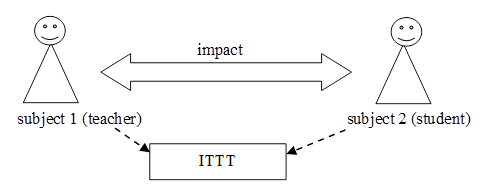
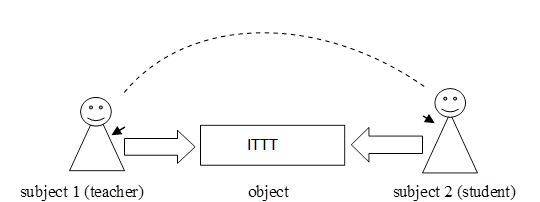
In such conditions, the main, most relevant skills of a teacher are not only his professional and pedagogical skills, but also ICT skills in order to be able to use technology in their daily work, for example, to access information on the Internet or use software to solve current pedagogical problems. It also increases the need for complementary skills that support new tasks related to using ICT in the workplace, such as using social networks to communicate with colleagues and students, promote methodological products on educational electronic platforms, and analyze big data., business planning of their teaching activities and the like (Tormasin, 2017; Lvov, 2017).
The introduction of the digital economy into the system of Russian higher education is difficult due to objective and subjective reasons: the lack of readiness of the information and educational environment of educational organizations to support the holistic process of electronic (digital) education; the lack of methods of teaching in the electronic environment, the mandatory system of advanced training in the field of electronic technologies; the lack of digital education teaching materials; the lack of a sufficient number of highly qualified programmers to solve multifactor problems of informatization of an educational institution; the lack of readiness of teachers for methodological support and methodological support of digital education; lack of awareness of the prospects and the need to use digital learning (Kostina, 2015).
In addition to these problems, there is one significant contradiction between the needs of the economy, the labor market, employers, on the one hand, the requirements of the higher education system - the changes in the educational process; on the other hand, by the demands of the main consumers of the educational service – students.
So, in the period from 2010 to the 2018 academic year in the Russian State Vocational and Pedagogical University among students of the second, third, and fourth courses of full-time, budgetary and commercial education in the directions of preparation 03.03.01 Economics, 03.03.02 Management, 44.03.04 Vocational training (by branches) a study was carried out, the purpose of which was to identify the factors that can influence the increase in academic performance from the point of view of students. Over the entire study period, more than 750 people were interviewed.
Analysis of the research results showed the following: in the 2010-2011 academic year, the main factors for improving student performance were changes in the schedule of classes, the maximum provision of special literature (textbooks, teaching aids) in print and organizational issues that ensure normal conditions for the educational process (organization and accessibility of food , the proximity of educational buildings, the provision of dormitories, etc.) The distribution of answers on courses is presented in Figure
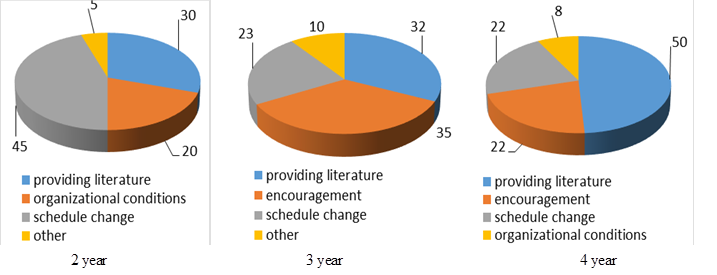
The priority factors for improving academic performance in the 2013-2014 academic year, according to students, were the promotion and availability of educational material in the library or in the electronic resources of the university. “Changing the schedule” was still an important factor in improving students’ performance, especially in the second and third year, which can be clearly seen in Figure
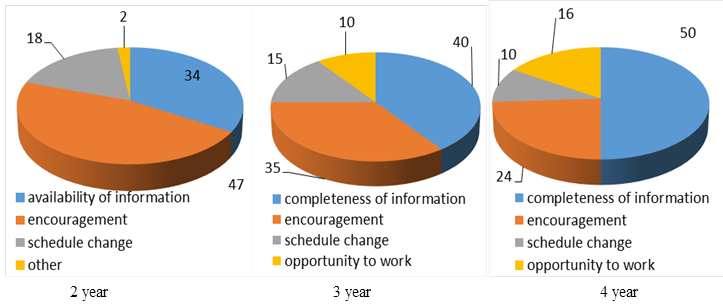
In 2018, the picture of student learning priorities changed radically - the factors of academic performance that were important for students in 2010-2011, in 2018 were insignificant. Economic (increase in the size of scholarships, additional payments, payment of travel, partial payment of food, accommodation in hostels) and organizational factors (change in the schedule of studies, catering, accommodation, transport, etc.) were practically not considered by students, especially in the third and fourth year. Second year students wanted to increase motivation in teaching by teachers and administration, through communication with teachers, through more personal, emotional contacts. The distribution of student responses in the 2018 academic year is presented in Figure
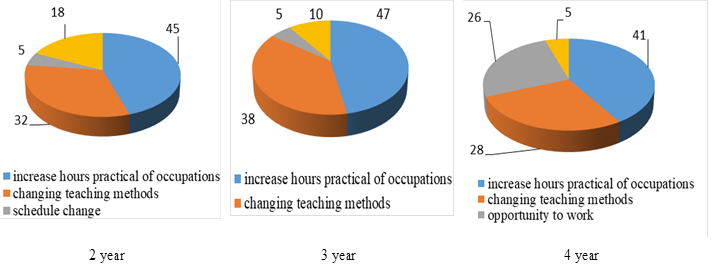
One of the most important factors in improving academic performance today is the change of methods and forms of education that students consider to be moving away from traditional forms and methods towards interactive teaching methods. Fourth-year students insisted on reducing the hours of lectures with a significant increase in the number of hours devoted to practical and laboratory classes. Paradoxical fact is that the factor “availability of work” has a positive effect on student performance, but only in the third and fourth years.
Thus, according to the results of the study, it can be concluded that in recent years, the expectations of the main consumers of educational services - students - coincide with the requirements of the economy and the labor market: not only the acquisition of knowledge, but the formation of practical skills, the ability to gain practical experience. But a paradoxical situation arises. As shown above (Figure
In the period of digital transformation, the role of university teachers changes significantly, they must use all possible techniques, methods, means of electronic and distance learning, as well as participate in innovative transformations of society and business communities, then they will be in demand in the information educational space. Despite the digital transformation of the educational process, changes in the forms, methods of teaching, competencies, classical fundamental education remains important for the formation of a modern system of vocational education (Nurieva & Kiselev, 2016; Prigozhina & Trostina, 2017).
Higher school teachers need to accept without hesitations that the formation of competencies, in particular among students, cannot be associated only with the development of theoretical courses presented to the student in lecture form. As a rule, competences are developed by a combination of various forms of learning technologies - work in practical and seminar classes; solving practical problems and problem situations; course paper and final qualifying thesis; writing scientific articles, abstracts and essays; performance at seminars, conferences; participation in research projects, etc., performed by students (Solovova, 2012).
Conclusion
To overcome the above contradictions, it is necessary:
1. To understand the necessity and inevitability of introducing a digital economy as a way of life, as a world view, as a target in education.
2. To rebuild psychologically educators for new learning technologies, the formation of internal readiness to create new innovative methodological support, maybe different from the generally accepted, standard, taking into account the intellectual level of students.
3. To change the approach to the implementation of their professional activities, involving changes in the technologies, contents of methodological support and methodological maintenance. It is no longer enough for a teacher to study something, to research, to identify connections and patterns. And it is not enough just to transmit knowledge. It is necessary to produce new knowledge in order to immediately apply it in practice. A practical, activity-based approach should be integrated directly into the educational process.
4. To change actively teaching methods and techniques. This will require, first, the development of new educational programs, the development of adequate forms and innovative methods of the educational process, the adoption of modern technologies for the transfer of knowledge with their orientation on practical activities; secondly, the transition from the stream system to individual educational programs and project-oriented training; thirdly, the mass development of online education (Irodov & Korechkov, 2018). It is necessary to try to replace the real practice with simulators, simulators, model systems, cases, inverted classes, using the Moodle system, known as a learning management system, or a virtual learning environment that belongs to the class of free software.
5. To development a new system of student motivation, develop and implement various compensation mechanisms for social and emotional dissatisfaction with the process of interaction in the system of teacher-student and student-student which can significantly increase the effectiveness of training.
6. At the same time, in order to meet modern requirements in higher education institutions, it is necessary to change the organization and content of faculty activities, increasing by 2/3 of their working time to engage in scientific work and only 1/3 of this time to spend on teaching students. Strengthening the scientific orientation of the faculty will enrich the educational process and will more closely meet the requirements of the information society and its component - the digital economy (Aliyev, 2017).
7. For teachers, the passage of advanced training programs taking into account "World Skills Russia" standards in terms of competencies that are a priority for the digital economy.
8. To meet the requirements of employers, it is possible to completely re-evaluate the qualifications of students. For example, business projects that they defended in their field, having received funding. Such a graduate is a ready-made specialist who has already proved something in practice. Or to introduce for the graduates of technical and economic specialities the demonstration exam in accordance with the requirement of World Skills.
References
- Aliyev, A.T. (2017). Digital economy and education. Conferenceual ASOU: a collection of scientific papers and materials of scientific conferences, 2, 129-133.
- Andreeva, G.N., Badalyants, S.V., Bogatyreva, T.G., Boroday, V.A., & Dudkina, O.V. (2018). The development of the digital economy in Russia as a key factor in economic growth and improving the quality of life of the population. Nizhny Novgorod, Russia: Professional Science. [in Rus.].
- Astlyaytner, G. (2000). Distance learning through the WWW: social and emotional aspects. Moscow, Russia: Mozhaisk-Terra. [in Rus.].
- Babkin, A.V., Burkal’tseva, D.D., Kosten’, D.G., & Vorobyev, Yu.N. (2017). Formation of the digital economy in Russia: essence, features, technical normalization, development problems. Scientific and Technical Statements of the St. Petersburg State Polytechnic University. Economic Sciences, 10(3), 9-25. DOI: 10.18721/JE 10301. [in Rus.].
- Bekhterev, A.N., & Loginova, A.V. (2013). The use of the MOODLE distance learning system in teaching vocational foreign language. Open education, 4, 91-97. DOI: 10.21686/1818-4243-2013. [in Rus.].
- Irodov, M.I., & Korechkov, Yu.V. (2018). Higher education in the digital economy. Bulletin of Eurasian Science, 1, 13-17. [in Rus.].
- Kamneva, V.V., & Konyayeva, E.A. (2018). Digital economy in education. Questions of Student Science, 3(19), 101-105. [in Rus.].
- Kostina, E.V. (2015). The blended learning model and its use in the teaching of foreign languages. News of Universities. Series: Humanities, 1(2), 141-144. [in Rus.].
- Kupriyanovsky, V.P., Sukhomlin, V.A., Dobrynin, A.P., Raikov, A.N., Shkurov, F.V. Drozhzhinov, V.I., Fedorova N.O., & Namiot D.E. (2017). Skills in the digital economy and the challenges of the education system. International Journal of Open Information Technologies, 5(1), 19-25. [in Rus.].
- Kuznyak, N.B., & Gagen, E.Yu. (2017). Modern distance learning. Advantages and disadvantages. Young Scientist, 11, 466-469. [in Rus.].
- Loginova, S.L. (2018). The phenomenon of the digital economy in the system of secondary and higher Professional education. In E.M. Dorozhkin & V.A. Fedorov (Eds.), Innovations in professional and professional-pedagogical education: materials of the 23rd International scientific and practical conference (pp. 77-80). Ekaterinburg: Russian State Vocational Pedagogical University. [in Rus.].
- Loginova, S.L., Akimova, O.B., Dorozhkin, E.M., & Zaitseva, E.V. (2018). Methodical competency as a basis of methodical activities of a teacher of the higher school in modern conditions. Espacios, 39(17), 20. URL: https://www.revistaespacios.com/a18v39n17/a18v39n17p20.pdf.
- Lvov, L.V. (2017). The projected rate of competence formation as a tool of educational management of advanced level of education. Obrazovanie i Nauka, 19(4), 39-57. DOI: 10.17853/1994-5639-2017-4-39-57. [in Rus.].
- Maccario, B. (1987). Cardinet (Jean). Evaluation scolaire et mesure. Cardinet (Jean). Evaluation scolaire et pratique. Cardinet (Jean). Pour apprécier le travail des élèves. (Revue française de pédagogie). French Journal of Pedagogy, 81, 103-108. URL: http://www.persee.fr/doc/rfp_0556-7807_1987_num_81_1_2434_t1_0103_0000_2.
- Nurieva, L.M., & Kiselev, S.G. (2016). Тhe problems of measurement the higher professional education institutions efficiency. Obrazovanie i Nauka, 18(4), 95-116. DOI: 10.17853/1994-5639-2016-4-95-116. [in Rus.].
- President’s message to the Federal Assembly (2016). URL: http://www.kremlin.ru/events/president/news/53379. Accessed 2 June 2018. [in Rus.].
- Prigozhina, K.B., & Trostina, K.V. (2017). Distance learning technology as a tool for competitive growth of educational programmes in universities. Obrazovanie i Nauka, 19(5), 166-187. DOI: 10.17853/1994-5639-2017-5-166. [in Rus.].
- Solovova, N.V. (2012). Management of methodical activity in the context of the implementation of innovative methodological tasks (Doctoral dissertation). Samara: Samara State University.
- Solovov. A.V. (2008). Technological means of e-learning. In A.V. Solovov (Ed.), Electronic collection of articles-winners of the All-Russian competitive selection of review and analytical articles on the priority direction "Information and telecommunication systems" (pp. 40-43). Moscow: GNII ITT "Informika".
- Stoof, A. (2002). The boundary approach of competence: A constructivist aid for understanding and using the concept of competence. Human Resource Development Review (HRDR), 1(3), 345-365. DOI:
- The program "Digital Economy of the Russian Federation" (2017). Approved by the Order of the Government of the Russian Federation dated July 28, 2017 No. 1632-p. URL: http://static.government.ru/media/files/9gFM4FHj4PsB79I5v7yLVuPgu4bvR7M0.pdf. Accessed 2 June 2018.
- Tormasin, S.I. (2017). Digital economics in vocational education. In N.V. Molotkova (Ed.), Materials of the International scientific-practical conference (pp 371-374). Tambov: Tambov State Technical University. TSTU.
Copyright information

This work is licensed under a Creative Commons Attribution-NonCommercial-NoDerivatives 4.0 International License.
About this article
Publication Date
20 March 2019
Article Doi
eBook ISBN
978-1-80296-056-3
Publisher
Future Academy
Volume
57
Print ISBN (optional)
-
Edition Number
1st Edition
Pages
1-1887
Subjects
Business, business ethics, social responsibility, innovation, ethical issues, scientific developments, technological developments
Cite this article as:
Loginova, S., Akimova, O., Shcherbin, M., & Zaitseva, E. (2019). The Specifics Of The Digital Economy In Higher Education. In V. Mantulenko (Ed.), Global Challenges and Prospects of the Modern Economic Development, vol 57. European Proceedings of Social and Behavioural Sciences (pp. 1-12). Future Academy. https://doi.org/10.15405/epsbs.2019.03.1

